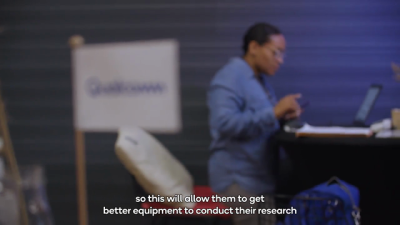Qualcomm Innovation Fellowship Europe Rewards Excellent Research in the Field of AI and Cybersecurity

Each Winner Receives Mentorship and $40,000 in Research Funding
DESCRIPTION:
AMSTERDAM, July 19, 2022 /3BL Media/ – Qualcomm Technologies, Inc., announced today the winners of the 13th edition of Qualcomm Innovation Fellowship (QIF) Europe program: Patrick Jattke (ETH Zurich), Stratis Markou (University of Cambridge), Francisco Vargas (University of Cambridge), and Dingfan Chen (CISPA Helmholtz Center for Information Security).
QIF is an annual program that focuses on recognizing, rewarding, and mentoring the most innovative engineering PhD students across Europe, India, and the United States. The Europe program rewards excellent young researchers in the fields of artificial intelligence and cybersecurity with individual prizes of $40,000, dedicated mentors from the Qualcomm Technologies team as well as the opportunity to present their work in person to an audience of technical leaders at the company’s HQ in San Diego.
“At QIF Europe, each year we are delighted by the insightful and forward-looking proposals we receive, and the 2022 cohort was no exception. The innovative researchers are set to impact important technology areas such as, interpretable AI, data privacy, fair and generalizable algorithms, and more,” said Jilei Hou, vice president and head of AI research, engineering, Qualcomm Technologies, Inc. “We are proud to support their novel research and look forward to seeing the winners thrive in the field of AI and cybersecurity in the coming years.”
The twelve finalists are PhD candidates from ETH Zurich, Imperial College London, Max Planck Institute, Tubingen University, University of Cambridge, University of Oxford, CISPA Helmholtz Center for Information Security, and Vrije Universiteit Amsterdam.
After careful review, the following four winners were selected for their outstanding proposals:
Patrick Jattke (ETH Zurich), supervised by Kaveh Razavi, has been selected for his proposal “Rowhammer Meets AI: Leveraging Deep Learning for Building a General Rowhammer Testing Methodology”.
Patrick’s proposal searches for a new methodology to find Rowhammer bit flips. Rowhammer is a hardware bug in modern memory and has been a concern for the semiconductor industry for almost a decade now. Details of existing solutions are often not disclosed, making it hard to assess their security guarantees. Patrick proposes to combine two state-of-the-art Rowhammer analysis techniques to automatically discover weaknesses in new devices.
Stratis Markou (University of Cambridge), supervised by Carl E. Rasmussen and advised by Richard E. Turner, has been selected for his proposal: “Systematic Design of Neural Process Models for Probabilistic Meta-Learning”.
Meta-learning is a part of machine learning concerned with “learning how to learn”. There are still significant limitations that affect its applicability in practice. The proposal aims to answer whether we can build meta-learning models which quantify their uncertainties well and have small test-time resource requirements, and whether we can reduce the amount of data collected necessary to train these models.
Stratis will investigate improving the class of models of Gaussian Neural Processes (GNPs) and moving beyond the Gaussian assumption within NPs. He will then investigate how to develop efficient equivariant NPs, which can improve performance with fewer parameters and easier training.
Francisco Vargas (University of Cambridge), supervised by Neil Lawrence, has been selected for his proposal: “A Unifying Framework for Sampling, Inference and Transport via Schrödinger Bridges”.
Francisco takes us on a journey through the Schrödinger Bridge problem, in which one tries to find the stochastic evolution between two probability distributions. He sets out to unify the work that has been done on this problem in the machine learning community through the lens of the Sinkhorn algorithm, relating variational inference, sampling, and optimal transport together. An exciting theoretical tour-de-force that when successful will provide interesting theoretical insights into the underlying continuous nature of several discrete algorithms and might make it possible to apply algorithms from the above fields to one-another.
Dingfan Chen (CISPA Helmholtz Center for Information Security), supervised by Mario Fritz, has been selected for her proposal: “Unifying Deep Generators for Privacy-preserving Data Sharing”.
In real-world applications, data sharing is often prohibited due to the private nature of data or corresponding regulations, which hinders technological progress. Differentially private (DP) data publishing, where only a sanitized form of the data (with rigorous privacy guarantees) is created using generative models, provides a solution. However, existing methods are still struggling to generate high-fidelity data that is useful for many real-world application scenarios. The proposal aims at providing a unified view of the design space for private generators and its systematic exploration to derive novel methods that cater to different use cases.
For more information about QIF, please visit: https://www.qualcomm.com/research/university-relations/innovation-fellowship
About Qualcomm
Qualcomm is the world’s leading wireless technology innovator and the driving force behind the development, launch, and expansion of 5G. When we connected the phone to the internet, the mobile revolution was born. Today, our foundational technologies enable the mobile ecosystem and are found in every 3G, 4G and 5G smartphone. We bring the benefits of mobile to new industries, including automotive, the internet of things, and computing, and are leading the way to a world where everything and everyone can communicate and interact seamlessly.
Qualcomm Incorporated includes our licensing business, QTL, and the vast majority of our patent portfolio. Qualcomm Technologies, Inc., a subsidiary of Qualcomm Incorporated, operates, along with its subsidiaries, substantially all of our engineering, research and development functions, and substantially all of our products and services businesses, including our QCT semiconductor business.
Tweet me:
